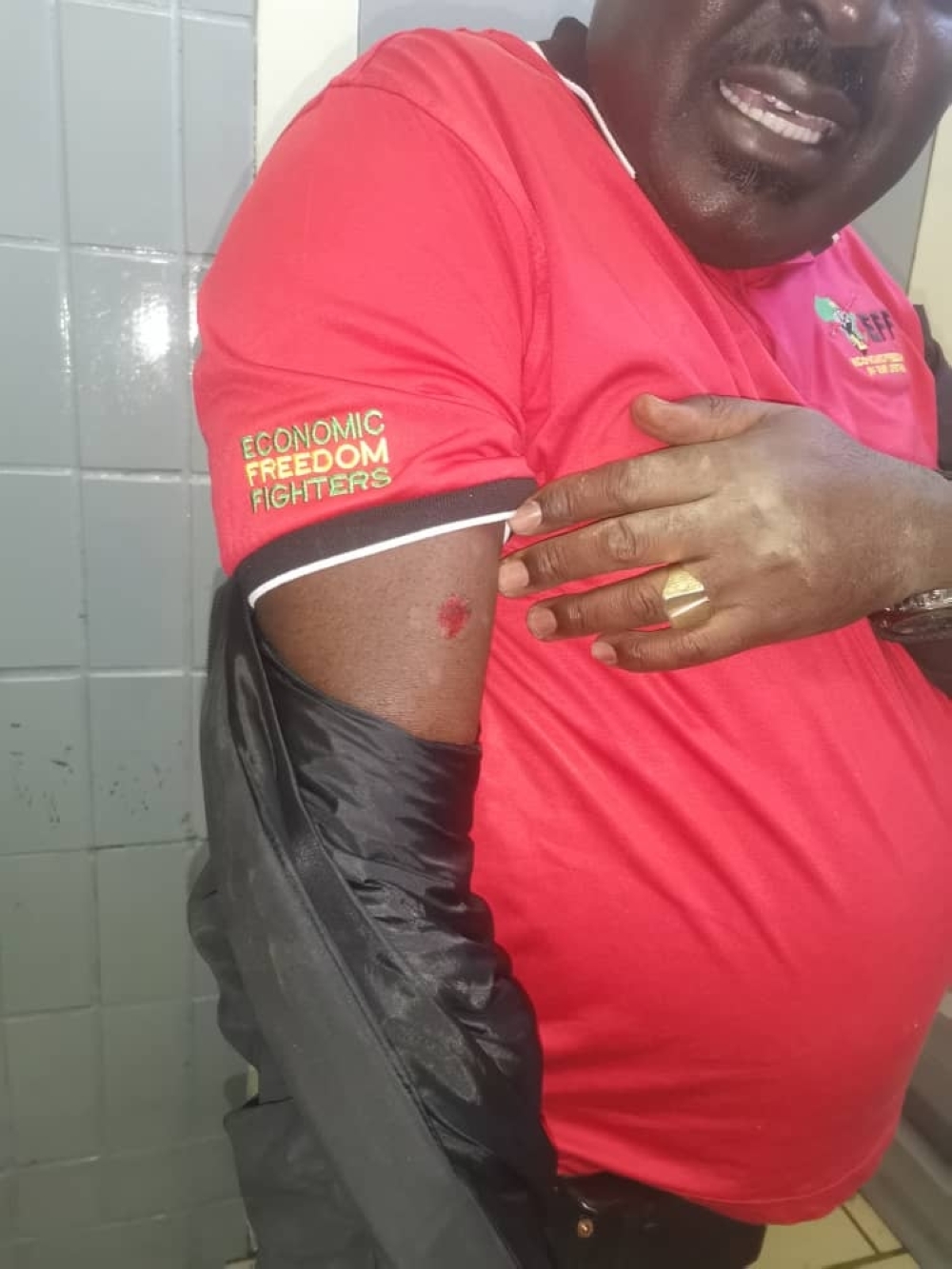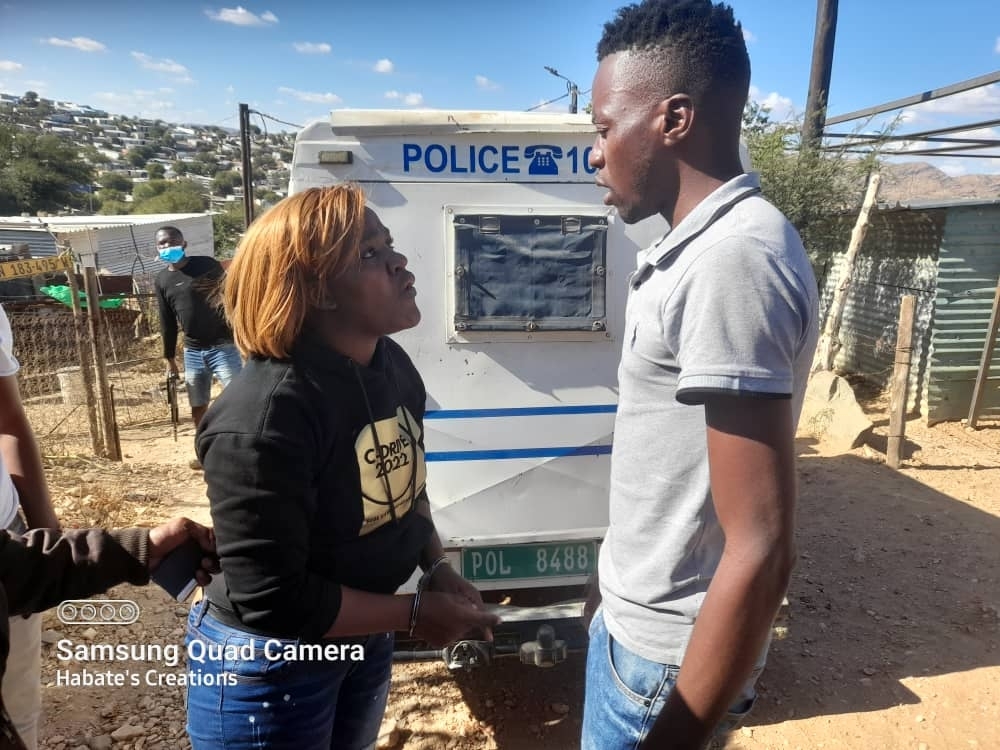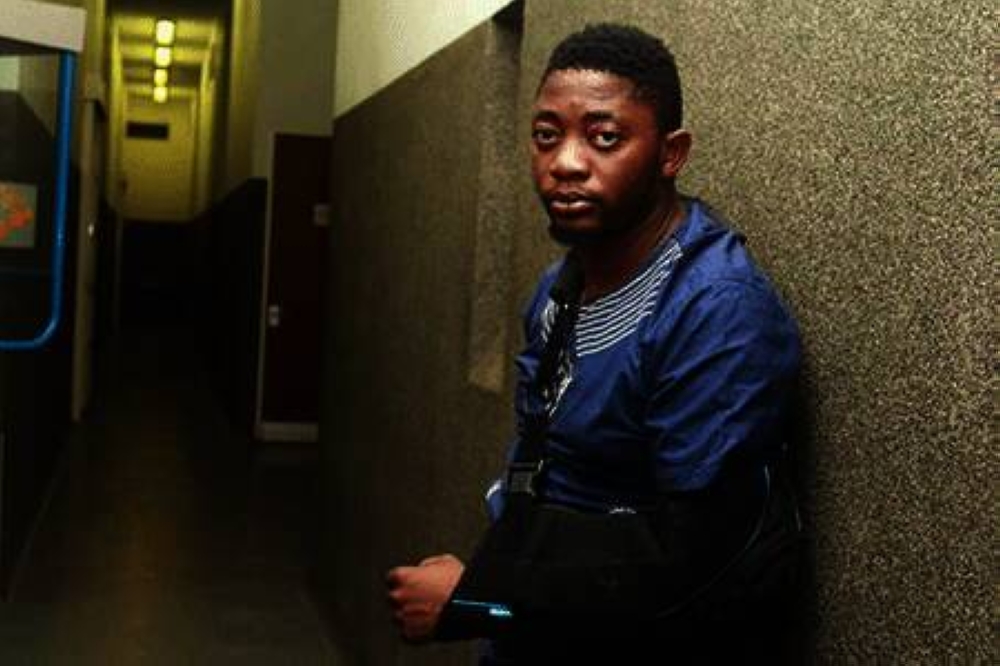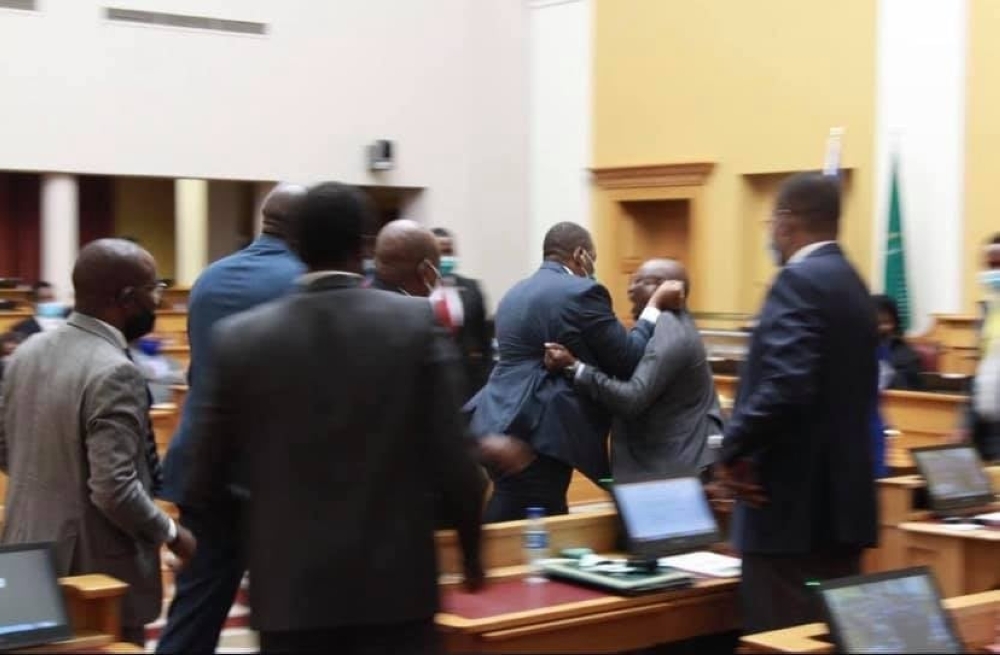‘It’s just a coincidence’
Ndeitunga defends arrests of perceived dissidents
The increasing incidents of arresting opposition politicians and activists, some of whom are currently in jail, are not politically motivated, police said.
Police chief Sebastian Ndeitunga yesterday said the increasing crackdown on opposition figures and activists is “pure coincidence” and not a planned systemic repression of voices of dissent.
In recent months, activists and opposition politicians have endured heavy-handed encounters with the police during protests against government policy and actions. Two of them – activist Dimbulukeni Nauyoma and Namibia Economic Freedom Fighters (NEFF) commissar Michael Amushelelo – are currently in jail.
The pair was arrested along with six others for threatening to close down Chinatown, following perceptions that the Namibia Revenue Agency (NamRa) was targeting imported counterfeit items by Namibians while the so-called hub of fake goods was left to operate freely.
NamRa has dismissed the allegations, saying the N$5 million worth of counterfeit goods it destroyed in recent months actually belonged to foreigners.
Although charges are similar for all eight persons arrested, only Nauyoma and Amushelelo were locked up. A magistrate’s court dismissed their formal bail application.
During the Chinatown protests, NEFF leader Epaphras Mukwiilongo sustained injuries after police allegedly shot him with a rubber bullet. He was briefly detained at the Windhoek Police Station, prompting South African politician Julius Malema, leader of the Economic Freedom Fighters, to call for his release.
On Monday, Windhoek mayor Sade Gawanas, from the opposition party Landless People’s Movement (LPM), was briefly arrested during a verbal confrontation with police reservists in the Okahandja Park informal settlement. She was released upon instruction from senior police figures.
Glaring juxtaposition
In March, five activists of the Affirmative Repositioning (AR) movement were each sentenced to a 10-day prison term or a fine of N$300 for violating Covid-19 regulations on public gatherings in 2020 while erecting a shack for a mentally-ill man in Goreangab informal settlement.
Elifas Nghitomoka, Isdor Kamati, Sem David, Victor Erastus and Samuel Jusias paid a fine to avoid jail time.
At the time, their case was juxtaposed with that of the ruling Swapo Party which organised a birthday gathering for its 60th anniversary. No one was arrested in that matter.
In April 2021, presidential security officers dragged LPM parliamentarians Bernadus Swartbooi and Henny Seibeb out of the National Assembly on instruction of Speaker Peter Katjavivi for unruly behaviour.
They were banned from Parliament, but challenged Katjavivi’s decision in both the High Court and Supreme Court, with the latter granting them passage back into the National Assembly.
‘Probably not professional’
Ndeitunga yesterday said this series of events are all a coincidence.
“I dismiss the notion that we are becoming a police state. We are a professional force and do not look at people’s political affiliation before arresting them.
“In the case of Amushelelo, everybody saw what he was doing and people were asking why the police were not acting. Now that we acted, it’s seen as a politically motivated move.”
The police boss said the arrest of Windhoek mayor Gawanas was “probably not professional” and should have been handled differently.
“Remember, these were police reservists and not professional police officers. We remain a professional, apolitical force. People are just emotional and some have PhDs in noise-making. We are not perfect but certainly our work is not politically influenced.”
“In the case of Swapo’s Covid violations, I think someone from the party headquarters paid a fine. The AR activists were sentenced after pleading guilty.”
Exercise restraint
Institute for Public Policy Research executive director Graham Hopwood yesterday said: “There is a genuine concern about police tactics in potential conflict situations considering what happened at Chinatown and in response to the #ShutItAllDown protest in 2020. It's very much the style of the pre-independence police to reach for tear gas, rubber bullets and batons when there is unrest. In independent Namibia, such methods should be avoided at all costs”.
He added: “With the economy in dire straits, there may well be more public demonstrations in the future at which frustration levels will be high. In order to avoid flashpoints where human life may be threatened, it is important for both demonstrators and the police to exercise restraint.”
Also commenting on the matter, human rights lawyer Norman Tjombe yesterday said: “While we have been concerned about the police’s heavy-handedness against citizens for a long time now, I don’t think that we have arrived at the situation that the police are targeting opposition leaders as a rule.
“However, the desperate treatment of, for instance, people who have violated the Covid regulations and Swapo's similar violations is cause for concern, and needs to be addressed as a matter of urgency.”
“Arrests and pre-trial detentions are clogging up the criminal justice system, with the result that accused are not properly prosecuted and instead released, while the rights of the accused are trampled upon by lengthy detentions, some who are found not guilty at the end of the trial," he said.
In recent months, activists and opposition politicians have endured heavy-handed encounters with the police during protests against government policy and actions. Two of them – activist Dimbulukeni Nauyoma and Namibia Economic Freedom Fighters (NEFF) commissar Michael Amushelelo – are currently in jail.
The pair was arrested along with six others for threatening to close down Chinatown, following perceptions that the Namibia Revenue Agency (NamRa) was targeting imported counterfeit items by Namibians while the so-called hub of fake goods was left to operate freely.
NamRa has dismissed the allegations, saying the N$5 million worth of counterfeit goods it destroyed in recent months actually belonged to foreigners.
Although charges are similar for all eight persons arrested, only Nauyoma and Amushelelo were locked up. A magistrate’s court dismissed their formal bail application.
During the Chinatown protests, NEFF leader Epaphras Mukwiilongo sustained injuries after police allegedly shot him with a rubber bullet. He was briefly detained at the Windhoek Police Station, prompting South African politician Julius Malema, leader of the Economic Freedom Fighters, to call for his release.
On Monday, Windhoek mayor Sade Gawanas, from the opposition party Landless People’s Movement (LPM), was briefly arrested during a verbal confrontation with police reservists in the Okahandja Park informal settlement. She was released upon instruction from senior police figures.
Glaring juxtaposition
In March, five activists of the Affirmative Repositioning (AR) movement were each sentenced to a 10-day prison term or a fine of N$300 for violating Covid-19 regulations on public gatherings in 2020 while erecting a shack for a mentally-ill man in Goreangab informal settlement.
Elifas Nghitomoka, Isdor Kamati, Sem David, Victor Erastus and Samuel Jusias paid a fine to avoid jail time.
At the time, their case was juxtaposed with that of the ruling Swapo Party which organised a birthday gathering for its 60th anniversary. No one was arrested in that matter.
In April 2021, presidential security officers dragged LPM parliamentarians Bernadus Swartbooi and Henny Seibeb out of the National Assembly on instruction of Speaker Peter Katjavivi for unruly behaviour.
They were banned from Parliament, but challenged Katjavivi’s decision in both the High Court and Supreme Court, with the latter granting them passage back into the National Assembly.
‘Probably not professional’
Ndeitunga yesterday said this series of events are all a coincidence.
“I dismiss the notion that we are becoming a police state. We are a professional force and do not look at people’s political affiliation before arresting them.
“In the case of Amushelelo, everybody saw what he was doing and people were asking why the police were not acting. Now that we acted, it’s seen as a politically motivated move.”
The police boss said the arrest of Windhoek mayor Gawanas was “probably not professional” and should have been handled differently.
“Remember, these were police reservists and not professional police officers. We remain a professional, apolitical force. People are just emotional and some have PhDs in noise-making. We are not perfect but certainly our work is not politically influenced.”
“In the case of Swapo’s Covid violations, I think someone from the party headquarters paid a fine. The AR activists were sentenced after pleading guilty.”
Exercise restraint
Institute for Public Policy Research executive director Graham Hopwood yesterday said: “There is a genuine concern about police tactics in potential conflict situations considering what happened at Chinatown and in response to the #ShutItAllDown protest in 2020. It's very much the style of the pre-independence police to reach for tear gas, rubber bullets and batons when there is unrest. In independent Namibia, such methods should be avoided at all costs”.
He added: “With the economy in dire straits, there may well be more public demonstrations in the future at which frustration levels will be high. In order to avoid flashpoints where human life may be threatened, it is important for both demonstrators and the police to exercise restraint.”
Also commenting on the matter, human rights lawyer Norman Tjombe yesterday said: “While we have been concerned about the police’s heavy-handedness against citizens for a long time now, I don’t think that we have arrived at the situation that the police are targeting opposition leaders as a rule.
“However, the desperate treatment of, for instance, people who have violated the Covid regulations and Swapo's similar violations is cause for concern, and needs to be addressed as a matter of urgency.”
“Arrests and pre-trial detentions are clogging up the criminal justice system, with the result that accused are not properly prosecuted and instead released, while the rights of the accused are trampled upon by lengthy detentions, some who are found not guilty at the end of the trial," he said.








Comments
Namibian Sun
No comments have been left on this article